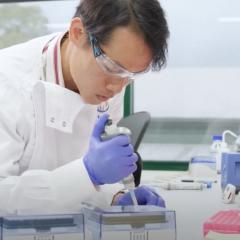Australia’s rising number of gonorrhoea cases has been described as a potential ‘perfect storm’, with the emergence of extensively drug resistant strains overseas.
University of Queensland researchers are leading a clinical study determining the most appropriate treatment for patients by analysing drug resistance from the DNA of the organism causing the infection.

Associate Professor David Whiley said this would enable the most powerful antibiotics to be preserved for cases that would not respond to other drugs.
“We know the antibiotic pipeline is wearing thin, so we’re using the molecular test to identify gonorrhoea that would be susceptible to older drugs like ciprofloxacin,” Dr Whiley said.
“Ciprofloxacin would not be recommended for general use but could be effective for many patients, instead of our really precious drugs that we need to protect.”
There were about 20,000 cases of gonorrhoea in Australia last year, with the highest incidences among men who have sex with men in urban areas, and among people living in remote Indigenous communities.
“Numbers have increased dramatically in the past five to 10 years, and we are actually getting up to rates which are similar to the pre-1980s HIV/AIDS campaigns around safe sex.
“We are losing the battle to control gonorrhoea even though we have organisms that are still very susceptible to our current drugs.”
The World Health Organization has recently warned about sporadic incidences – including one case in Australia – of gonorrhoea resistant to all current antibiotics.
“That was a tourist who appears to have been infected by a fellow tourist somewhere in Australia and left the country, and we haven’t been able to find that strain since,” Dr Whiley said.
 “The key thing is for GPs and sexual health clinicians to ring all the alarm bells if someone appears to have failed treatment, particularly if it’s our current first-line dual therapy of the antibiotics ceftriaxone and azithromycin.
“The key thing is for GPs and sexual health clinicians to ring all the alarm bells if someone appears to have failed treatment, particularly if it’s our current first-line dual therapy of the antibiotics ceftriaxone and azithromycin.
“We really want to know about that, and fortunately that message is getting out there.
“But really, in Australia at the moment we have a control issue rather than a treatment issue.”
Dr Whiley said he would not currently expect patients who walk through the clinic door to have their treatment fail in Australia.
“If we were to suddenly have gonorrhoea organisms that are very difficult to treat, that’s almost the perfect storm—we definitely don’t want that.”
The molecular methods of detecting resistance will offer improved ability to detect the emergence of drug-resistant strains, and for the first time will be fast enough to directly guide individual patient treatment.
Dr Whiley’s research is funded by the National Health and Medical Research Council (NHMRC).
Media: Associate Professor David Whiley, d.whiley@uq.edu.au; Sam Benger, s.benger@uq.edu.au, 07 3365 5118.



